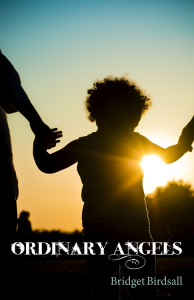
Some books provide escapism. Some books make you think. Some books force you to confront emotions that
are so raw you don’t know what to do with them.
That’s what Bridget Birdsall’s book, Ordinary Angels, did for me. I have never experienced the kind of personal
grief or fear or confusion that Birdsall brings to the printed page. But I came
to understand it just a little bit reading Ordinary Angels.
are so raw you don’t know what to do with them.
That’s what Bridget Birdsall’s book, Ordinary Angels, did for me. I have never experienced the kind of personal
grief or fear or confusion that Birdsall brings to the printed page. But I came
to understand it just a little bit reading Ordinary Angels.
Birdsall’s story of a family trapped by their own inner demons
and the horrific death of a sibling is told in present tense using second
person narration. That’s right–second person. It feels as if you are lying in
bed at night next to her character May O’Mally, listening in as she reminds herself of how her little brother was found dead in a neighbor’s driveway and how nobody knows who was responsible for his
death and nobody will talk about it. You
imagine that she must tell herself that story every night of her life.
and the horrific death of a sibling is told in present tense using second
person narration. That’s right–second person. It feels as if you are lying in
bed at night next to her character May O’Mally, listening in as she reminds herself of how her little brother was found dead in a neighbor’s driveway and how nobody knows who was responsible for his
death and nobody will talk about it. You
imagine that she must tell herself that story every night of her life.
Indeed, Bridget Birdsall told me, as we sat chatting over café
mochas one sunny afternoon, that Ordinary Angels, though fiction, was a
“semi-autobiographical” novel.
She wrote the book in order to make sense out of an emotional chaos that had dogged
her all her life. So we listen in as May deals with her own guilt–the kind of
guilt only a child can lay on themselves for not having saved a brother who
couldn’t be saved– and we learn about growing up in a family where as the
oldest child she had to take over responsibility for her siblings because her
mother’s addiction to alcohol not only kept her from mothering but caused her
to be an abuser of the children.
mochas one sunny afternoon, that Ordinary Angels, though fiction, was a
“semi-autobiographical” novel.
She wrote the book in order to make sense out of an emotional chaos that had dogged
her all her life. So we listen in as May deals with her own guilt–the kind of
guilt only a child can lay on themselves for not having saved a brother who
couldn’t be saved– and we learn about growing up in a family where as the
oldest child she had to take over responsibility for her siblings because her
mother’s addiction to alcohol not only kept her from mothering but caused her
to be an abuser of the children.
The story is necessarily dark, but not brooding. Its themes
are adult, but adults of all ages as well as teens and young adults in families dealing with addiction
and abuse will identify with them. The story is
intimate and raw, but uplifting and inspirational.
are adult, but adults of all ages as well as teens and young adults in families dealing with addiction
and abuse will identify with them. The story is
intimate and raw, but uplifting and inspirational.
Ordinary Angels is an amazing piece of literature. As I
said, I have had the good fortune never to have experienced the kind of trauma
or life that its characters experienced, but in my work as a teacher I deal with
many children who have gone or are going through similar emotions. As I “experience” life through the
eyes, the words, and the heart of May, this book gives me a bit of insight, a
path to empathy, a way to begin understanding my students whose lives don’t
match the comforting, loving paradigm of my own life. And the book gives me hope for
them.
said, I have had the good fortune never to have experienced the kind of trauma
or life that its characters experienced, but in my work as a teacher I deal with
many children who have gone or are going through similar emotions. As I “experience” life through the
eyes, the words, and the heart of May, this book gives me a bit of insight, a
path to empathy, a way to begin understanding my students whose lives don’t
match the comforting, loving paradigm of my own life. And the book gives me hope for
them.
Ordinary Angels is currently only available in paperback,
but can be ordered through Amazon or through local bookstores.
but can be ordered through Amazon or through local bookstores.

